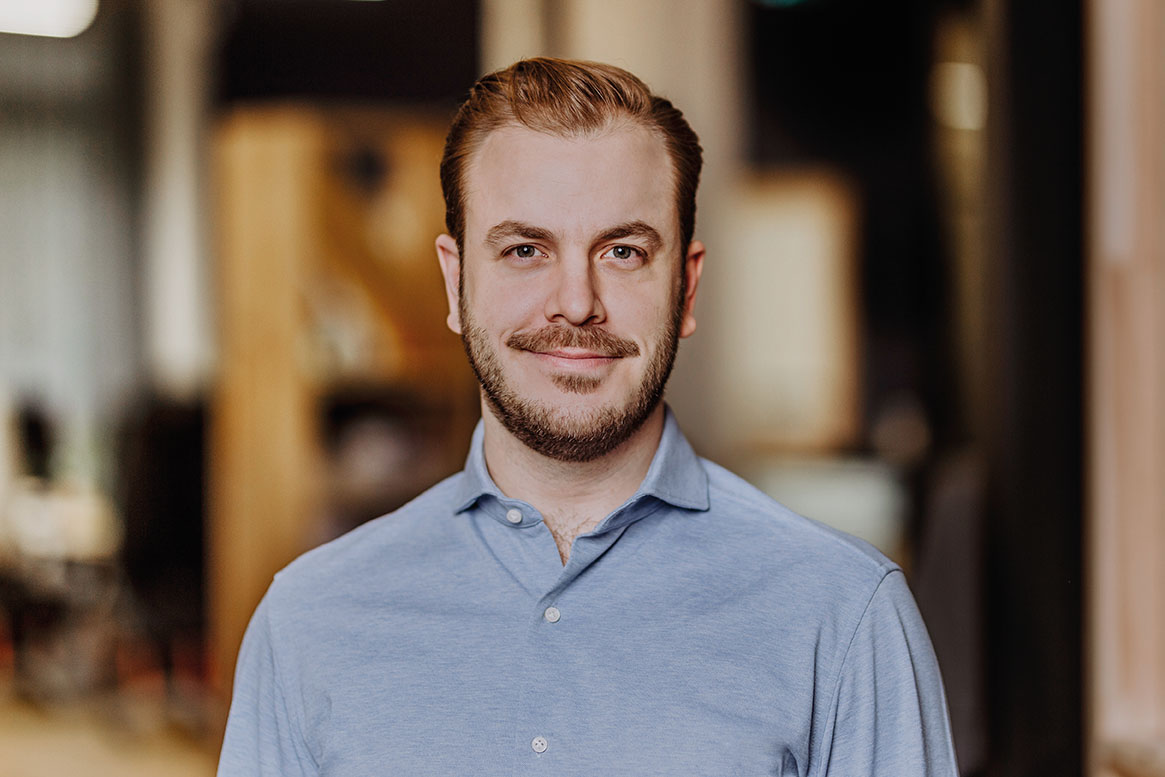May we introduce: Kim Felix Fromm of Raisin
Working in the FinTech industry is like coming and going, requires a high degree of professionalism in a thoroughly relaxed working environment and is above all characterised by innovation as well as good, clever and future-oriented ideas, according to the widespread consensus. But who are actually the brains and movers behind these creative thought processes, at the intersection of finance, digital technologies and entrepreneurship? In our series: The Faces of FinTech, we regularly ask one person from the payments and banking industry the same ten questions. This time Kim Felix Fromm answers our questions.
May we present…
In the course of our day-to-day work, we frequently encounter exciting people who work in the same field, who we meet only once or every now and then, or who have even grown very fond of us privately – each of them has a story of their own. We interviewed a few of thesepeople from our closest FinTech environment to put a face to them. To share why this industry is much more to them than just another way to pay his rent. We would like to briefly portray and introduce these people and their vita in a category of their own and have designed a questionnaire that is always the same.
This time Kim Felix Fromm answers our questions. Kim is Chief Investment Officer (CIO) at Berlin-based fintech Raisin and leads the investment and retirement products division.
Who are you, what do you do?
Hi, I’m Kim.
The shortest answer: helping people build wealth – with simple and fair products.
The long version: I am the Chief Investment Officer and VP Investment & Pension Products at Raisin, responsible for the investment and pension division. In Germany, we are better known under the WeltSparen brand. However, we are active throughout Europe (and soon the USA).
Our oldest business segment is the intermediation of deposits between banks in need of financing and investors who have no desire for low or negative interest rates. We have also been active in the investment sector for just under three years. In 2019, we acquired a provider of government-sponsored ETF-based retirement products, which we successfully integrated last November.

In 2019, we acquired a provider of government-sponsored ETF-based retirement products, which we successfully integrated last November.
What does a classic day in your life look like?
Lockdown-related, unfortunately, quite uniform at the moment. After getting up, I drink green tea and check my email. If I don’t need to do something right away, I meditate after. Always sounded esoteric to me, but a good friend recommended Sam Harris’ app, which makes it convincing to even the most skeptical.
I like to cross-read in the evenings; I’ve given a few book recommendations here once. After resisting series for a long time (successfully until five years ago), I can’t get past streaming. Right now I’m watching The Mandalorian, unexpectedly good. To stay fit, I force myself to do strength training at home and jog. In normal times I like to try out restaurants and bars in Berlin and Frankfurt. In Berlin I would recommend a visit to the wine bar Freundschaft to everyone.
What were your first encounters with the payment and banking industry?
I did a banking apprenticeship at BHF-Bank (now Oddo-BHF) straight after leaving school. At the time, that was the banking equivalent of the Siemens regular apprenticeship. Afterwards I studied at the Frankfurt School of Finance & Management with a scholarship. That was a super education across banking.
When did you first notice the word FinTech?
First I noticed Wealthfront and Betterment, which had a super concept and were already active in the US around 2010. FinTech is probably something I first heard in 2012 or 2013. The first companies were still quite ridiculed at that time. Since then, the industry has developed extremely strongly.
How do you define FinTech?
As an investment person, the very first thing I look at is papers. That’s where this definition comes closest: “Fintech is a new financial industry that applies technology to improve financial activities.”

However, I would also include established companies that – if they manage the step into digitization very well – also use technology to improve financial products. Goldman Sachs, one of our investors, even describes itself as a technology company. There are now over 10,000 developers working there.
Also, most successful hedge funds today are pure high-tech firms that employ mostly smart scientists.
What do you think established companies do better than FinTechs?
The contradiction from the question only exists if we go back to the narrow FinTech definition as young companies.
Established firms have very well organized advocacy with government agencies such as politicians and regulators. As a result, they have a good feel for compliance issues in product development. They also often know their customers better because they invest more in market research and the relationship has grown over years.
What can you learn from FinTechs?
It is astonishing which processes at banks still involve manual steps. These incumbents have been learning through partnerships with FinTechs for quite a while now. We have over 100 partner banks, some of which we have been working with for nine years. This results in a transfer of knowledge in both directions. After many FinTechs were very rowdy in the beginning, established banks and FinTechs are increasingly approaching each other. They no longer see each other as competitors, but as partners who mutually benefit from each other.
FinTechs are setting the standard in identifying problems with traditional business models. And they’re finding creative and efficient ways to solve these problems digitally while delivering a better customer experience. At the same time, FinTechs are extremely data- and number-driven and adapt their insights immediately, so from my point of view the mutual win-win is given.
Why do established (large) companies have such a hard time with digitalization?
From my perspective, there are two major issues. The first is Legacy-IT: antique core banking systems assembled from individual solutions (some still in Cobol). The pain at some major banks clearly shows that. In the end, young fintechs simply have the advantage of starting on a greenfield site and building their systems according to the current state of the art – in ten years, this will be legacy again, we even see this with older fintechs.
Second, banks face a dilemma. In the credit sector, the banks’ bread-and-butter business, there is a considerable compression of margins due to the persistently low interest rates. The commission business, especially the sale of investment products to private investors, saves the banks from major problems. In fact, the margins there are also much higher than digital competitors. However, this means that the innovative approaches that do exist (many banks have developed digital investment solutions) are facing massive internal headwinds. In the current situation, the risk of cannibalisation of the business through a lower-margin offering is not acceptable in the view of many board members.
What makes your job interesting on a daily basis?
I am responsible for investment and pension products as a whole, which means I deal with everything from marketing and biz dev to product and investments. On the one hand, I am a manager and interface. I share my knowledge and learn myself in individual areas. This is very demanding, often connected with new things and above all varied. Plus, working in a team with so many bright minds like tech specialists, finance pros, and dedicated newcomers is really fun.
“My job is demanding, often involves new things, and most importantly, it’s varied.”
What would you do for a living if you weren’t working in the payments and banking industry?
I’m afraid I have terribly banker-stereotypical interests. I love old cars. Between my time at BHF-Bank and Liqid, I worked for four months in a workshop for old and young cars. Screwing and maybe trading cars would be fun for me. An alternative would be Sommelier. Combinations of food and the huge selection of exciting wines I find delightful. A super challenging job that also comes with a social component through contact with guests.
What are you proud of?
To the team at Raisin, which is extremely collegial and focused on the customer. This makes us successful as a company and I enjoy it enormously. The best summary of our philosophy was once given to me by Tamaz, our CEO, in a discussion on Product Features: “Easy-peasy, cheap, not sleazy.” Our products are easy to use and structured in a comprehensible way. We are cost leaders, everything the customer saves in fees is left over in the end as an additional return and via the compound interest effect even small differences end up being large amounts! And we have no hidden commissions, kick-backs or other disadvantages for the customer. Our products do extremely well in consumer protection and other tests, which is probably the best proof of good financial products.
Why aren’t there more women in tech?
That’s probably material for an interview of its own. This is even more true for FinTechs, by the way, is my feeling, because there are fewer women working in the financial industry than in other industries. I see two problems.
First, there are too few women in the industry, which discourages young women from entering the field. So it’s a chicken and egg problem. I am very sceptical about quota systems, because they can lead to other problems and other discrimination. However, Lea, our HR manager, convinced me how low quotas can help against this problem and make more female role models visible. And certainly a heterogeneous team has a positive influence on the culture of companies and, in the best case, breaks through the culturally difficult “boys clubs”. And let’s not kid ourselves, they definitely exist in the German fintech scene.
Second, there is a strong gender preference in career choice. For example, women disproportionately choose social professions. These preferences are even most pronounced in very egalitarian societies, such as the Scandinavian countries. But that doesn’t mean there’s nothing you can do about it.

Greater diversity – and here I mean real diversity and not just gender-based – across all professions would be a benefit. However, solutions for a change in thinking are likely to take a very long time.
Parents should try not to push children in one direction, but deliberately show them all the possibilities. There are also approaches in education policy to make scientific and technical professions more interesting for women in general. The shaping of roles starts very early, so that the school is even a little late – and sometimes even has deficits to promote boys.
Now we have a great responsibility as an employer. What do we want to stand for, how do we want to work together and what is important to us in our team? We are committed to inspiring female talent, especially in disciplines where it is particularly difficult. We are tackling the role model issue – without the need for a quota so far. Above all, we are trying to enable women to pursue careers and help them to reconcile work and family life. In the management and leadership team, for example, we have a disproportionately high number of new mothers and fathers.
Which company would you like to work for one day?
I would like to try out Google for a day, especially because of the much-cited work culture that promotes creativity and personal responsibility. That makes you curious. And, of course, I’d love to know what they’re quietly working on there.
Who would you like to have a beer with?
I would meet for a beer with Ray Dalio, founder of Bridgewater, one of the most successful hedge funds in the world. Ray Dalio’s company is known for a culture based on extreme openness and constant feedback. Judgments on this vary extremely, but something seems to be going right.
About the person: Kim Felix Fromm
Kim Felix Fomm is Chief Investment Officer (CIO) at Raisin and leads the investment and retirement products division. Before joining Raisin in 2019, Kim helped build digital asset manager Liqid. There, as Managing Director, he was responsible for the areas of Investments, Finance and Business Intelligence. Previously, he worked for BHF-Bank in the areas of asset management and alternative investments. After completing his banking apprenticeship, he studied business administration (Frankfurt School of Finance & Management/HEC Montréal) and a master’s degree in political economy at Zeppelin University and King’s College London.
Kim lives in Berlin and Frankfurt and is happy when the techno clubs are allowed to open again. He reads widely, but is particularly interested in medieval and economic history. Finding little time for hockey, Kim stays in shape by staying fit as a balance to work. He is also a mediocre but avid skier and has a soft spot for fine wines and classic cars.
